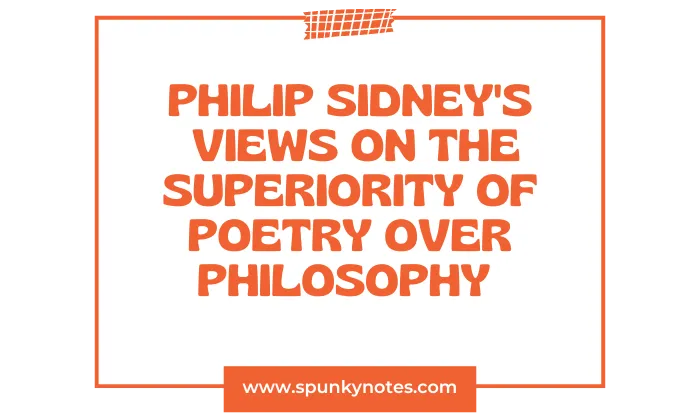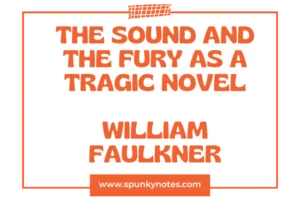
Q. Discuss the views of Philip Sidney on the superiority of poetry over philosophy as proposed in Apology for the Poetry.
Introduction
In “The Defence of Poesy,” Sir Philip Sidney crafts an argument favouring the superiority of poetry over other forms of literature, notably philosophy.
He contends that poetry is unique because of the following qualities:
- Emotional Engagement
- Creative Flexibility
- The Power of Mimesis
- Poetry’s Function as a ‘Speaking Picture’
- The Didactic Power
- Memory Aid and Knowledge Repository
- The ‘Passport’ to Popular Judgement
1- Emotional Engagement
Sidney believes that poetry’s emotional connection with readers gives it an advantage over philosophy. He asserts that philosophical discourse can be intellectually challenging due to its abstract approach. Furthermore, its analytical nature often makes it less accessible to many readers.
In contrast, poetry employs sensual and emotional language that resonates with readers personally. He states,
For the philosopher, setting down with thorny arguments the bare rule, is so hard of utterance and so misty to be conceived, that one that hath no other guide but him shall wade in him till he be old before he shall find sufficient cause to be honest.
Sir Philip Sidney, in “The Defence of Poesy,” suggests that philosophy alone cannot guide one towards a virtuous life.
Philosophers may struggle to communicate their ideas clearly and straightforwardly, leading to confusion and moral ambivalence.
With its dynamic and imaginative power, Sidney argues that poetry can fill this accessibility gap. He believes it gives readers a clearer, more tangible vision of moral life.
2- Creative Flexibility
Sidney also contends that poets enjoy creative flexibility that philosophers do not. Philosophers are tied to logical and systematic argumentation, while poets can explore the imaginative realm.
Poets can construct scenarios and create characters that illustrate moral principles in a more engaging and relatable way. Sidney argues,
Only the poet, disdaining to be tied to any such subjection, lifted up with the vigour of his own invention, doth grow in effect into another nature, in making things either better than nature bringeth forth, or, quite anew…
In this passage, Sidney argues that poets are not constrained by the same limitations as philosophers and other scholars. Whereas philosophers are bound to “thorny arguments” and “bare rules,” poets can invent new worlds and create original forms.
Sidney sees this as a significant advantage for poets, as they can offer readers a vision of creativity and beauty. By lifting their imaginations, poets can transcend the limitations of nature and communicate profound truths about the human experience.
3- The Power of Mimesis
Sidney further extols the mimetic power of poetry, which he sees as surpassing philosophy. He points out that poetry can ‘imitate’ or reflect life. However, it is not simply in a literal sense but in a subtle, thoughtful manner that encompasses the complexities and subtleties of human experience. He argues,
The poet, he nothing affirms, and therefore never lieth…
Because poetry does not seek to make definitive statements, it cannot lie or mislead. Poetry, as Sidney advocates, is a form of vivid and imaginative expression. It can touch readers’ hearts and minds in significant ways.
Sidney advocates that poets construct a domain of liberty and potential by implying meanings rather than making outright assertions. This allows readers to probe into the complexities and mysteries of life.
4- Poetry’s Function as a ‘Speaking Picture’
He also proposes that poetry serves as a ‘speaking picture’. It provides vivid and emotionally engaging imagery that brings moral and ethical principles to life. Sidney contrasts this with the often dry, abstract language of philosophy, asserting,
With a tale forsooth he cometh unto you, with a tale which holdeth children from play, and old men from the chimney corner.
Sidney argues that poets are like monarchs in the realm of storytelling. They are not only master storytellers but are also able to inspire others to create and explore the world of narrative.
Poets can entice readers into exciting realms of storytelling by offering a “sweet prospect” into the world of imagination. Sidney sees this as the true power of poetry – not just to entertain or educate, but to inspire the world.
5- The Didactic Power of Poetry
Sidney praises the didactic power of poetry and its ability to teach while delighting its audience. Sidney asserts that moral lessons embedded in poetry are more readily absorbed. He believes that moral lessons are presented in a pleasant manner.
Philosophy, by contrast, may present ethical teachings in a more austere, rigorous manner, which may not be as effective in encouraging moral improvement. As Sidney states,
The final end is to lead and draw us to as high a perfection as our degenerate souls… can be capable of..
Sidney argues that the ultimate goal of poetry is to lead us towards moral and intellectual perfection, despite the inherent limitations of our flawed humanity. Sidney suggests that poetry can help us transcend our limitations and achieve a more profound understanding of the world.
As such, poetry is a powerful force for progress and transformation, leading us towards a “high perfection” that we might not have thought ourselves capable of achieving.
6- Poetry as a Memory Aid and Knowledge Repository
Sidney adds another dimension to his argument by emphasizing the mnemonic power of poetry. He notes that the verse’s rhythmic and orderly structure makes it an excellent tool for memory.
He regards it as “the only handle of knowledge.” This assertion suggests that poetry’s ability to enhance recall gives it an advantage over philosophy. He writes,
So that, verse being in itself sweet and orderly, and being best for memory, the only handle of knowledge, it must be in jest that any man can speak against it.
This statement underscores Sidney’s belief in the superiority of poetry, as it not only educates and inspires but also aids in preserving and recalling knowledge.
Sidney is pushing back against the idea that poetry is somehow trivial or unworthy of study. He argues that, far from being a second-rate form of knowledge, poetry is the best way to remember and learn about the world around us.
By using rhythmic language, poets can help us to understand complex ideas and experiences in a way that no other form of discourse can match. As such, poetry is not just an enjoyable pastime but a vital tool for exploring the mysteries of life and thought.
7- Poetry as the ‘Passport’ to Popular Judgement
Finally, Sidney introduces the metaphor of poetry as a ‘passport’ to popular judgment. He suggests that the general public would not have appreciated the philosophical and historical narratives if they had not been articulated through poetry. He states,
So that truly neither philosopher nor historiographer could at the first have entered into the gates of popular judgements, if they had not taken a great passport of poetry.
This metaphorical ‘passport’ alludes to the wide-ranging appeal of poetry, which can reach a broader audience than philosophy’s often complex and abstract discourse.
By being expressed through poetry, philosophical ideas and historical events become more digestible and relatable.
Conclusion
In conclusion, Sidney’s “An Apology for Poetry” offers a compelling argument for the superiority of poetry over philosophy. It highlights poetry’s emotional resonance, creative flexibility, inspirational capacity, mimetic power, vividness, and didactic potential.
Sidney highlights poetry’s distinctive capacity to engage, educate, and inspire. Thus, in Sidney’s view, poetry is not merely a form of literary art but a potent tool for moral instruction, personal growth, knowledge preservation, and popular engagement.
Philip Sidney, in “An Apology for Poetry,” extols the virtues of poetry, strongly promoting its superiority over philosophy. He emphasizes poetry’s unique ability to preserve and recall knowledge, arguing that the verse’s pleasing and orderly nature is a memorable medium for storing wisdom.

